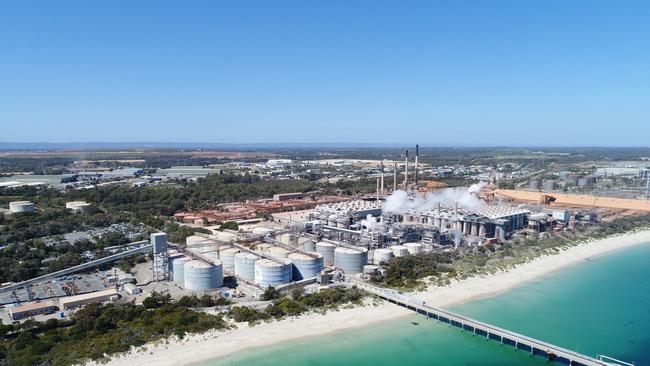WA Kwinana alumina refinery closure to wipe out 1000 jobs
More than 1000 jobs will be lost after US giant Alcoa decided to close its Kwinana alumina refinery in WA, making it the third and largest Australian resources project to come to a halt in less than a week.

More than 1000 jobs will be lost after US giant Alcoa decided to close its Kwinana alumina refinery in Western Australia, making it the third and largest Australian resources project to come to a halt in less than a week.
The decision to end operations at the 60-year-old refinery – which sits in the electorates of both WA Premier Roger Cook and federal Resources Minister Madeleine King – was confirmed by Alcoa on Tuesday, just weeks after it and the state government agreed to new rules curbing its ability to mine in WA’s environmentally sensitive jarrah forests.
The Kwinana refinery was the first of three such facilities built in WA by Alcoa, and for decades sat alongside BP’s Kwinana oil refinery at the core of the local community. The closure of both facilities have now been announced in the past two years.
Opposition state development spokesman David Honey, who spent years working at the Kwinana refinery before entering parliament, blamed the curtailment on the “tardiness” of the WA government around issuing Alcoa new mining approvals and the risks posed by the federal government’s requirement for companies to reduce their emissions by 43 per cent by 2030.
He warned more such closures would follow around Australia unless the Albanese government wound back its emissions plans.
“The tragic thing about (the closure) is it was unnecessary,” he told The Australian.
“You’ve got the state Labor Party dithering over Alcoa’s mining lease despite the fact that they’ve operated safely in the forest for over 60 years without any incidents whatsoever, and you’ve got the sword of Damocles hanging over the head of every major manufacturer in Australia through federal Labor’s emissions reduction target.”
The decision to end production at Kwinana came just minutes after the administrators of collapsed miner Panoramic Resources announced that the company’s Savannah nickel mine in WA’s Kimberley would be closed in response to ongoing weakness in nickel prices. About 140 jobs are expected to be lost as a result.
And just last week, Core Lithium stopped mining at its Finniss operation near Darwin due to a collapse in lithium prices. More than 150 jobs have already been axed at the mine, and that figure is expected to rise.
About 800 Alcoa employees and more than 300 contractors worked at the Kwinana refinery. Those numbers will fall to just 50 by the third quarter of next year.
Late last year, the WA government announced new conditions around Alcoa’s ongoing bauxite operations in the state’s southwest, which had come under scrutiny over their potential impact on drinking water supplies and environmentally sensitive jarrah forests.
Both Alcoa and its partner, ASX-listed Alumina, welcomed the new requirements at the time.
Mr Cook said the refinery’s closure would have a significant impact on the local community.
“You actually have sons and daughters and grandsons and granddaughters working on that facility in the same way that their predecessors did, so this is going to be a kick in the guts for the Kwinana and Rockingham communities,” the Premier said.
The economics of the refinery, he said, were challenged by its particularly old technology.
“The Kwinana refinery is obviously the oldest of Alcoa’s refineries and would be the one most challenged by the suppressed market conditions that they’re currently experiencing,” he said.
Ms King told The Australian she was extremely disappointed with Alcoa’s decision, which she said was due to factors beyond the government’s control.
“The reason Kwinana is being curtailed is because of geology – the bauxite grade has declined – and the age of the facility, and these are two things that we cannot be blamed for,” she said.
Alcoa executive vice-president Matt Reed said on Tuesday the company would look to redeploy some of the refinery workers elsewhere within its business or help them find work with other employers.








To join the conversation, please log in. Don't have an account? Register
Join the conversation, you are commenting as Logout